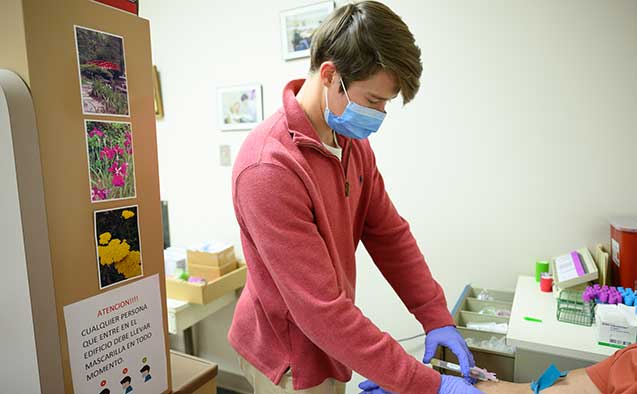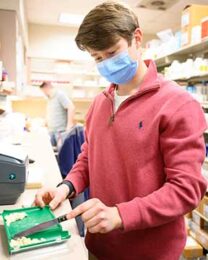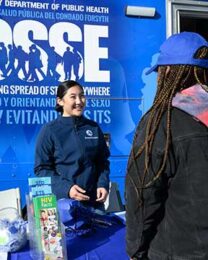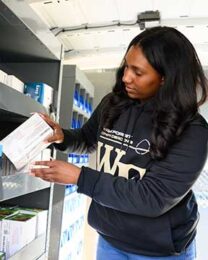WFU students meet critical public health needs
University a leader with new national AmeriCorps program

Highlights
- Wake Forest selected for first-ever Public Health AmeriCorps program
- The new national program aims to address workforce shortages and increase diversity in public health
- WFU students serve at local nonprofits that support underserved populations in Forsyth County
It’s a busy weekday and the waiting room at the Community Care Center in Winston-Salem is packed with patients. Tripp Causby is analyzing glucose levels.
In August, Causby became one of the first Wake Forest participants in Public Health AmeriCorps, a new federally-funded program that aims to address urgent public health needs in communities and train the next generation of public health leaders.
“I’m getting a lot of hands-on experience in a clinical setting,” he said. “The program has also exposed me to many inequities in healthcare that I hope to combat one day as a physician.”

Tripp Causby counts medications in the clinic’s dispensary.
Last year, the Community Care Center provided 11,000 patient visits, making it one of the largest free health clinics in the Southeast. Causby helps with patient navigation services where he triages patients and serves as a patient coordinator. He also assists in the clinic’s medication dispensary and writes grants, in addition to doing lab tests.
“A lot of our clients who are uninsured work two or three jobs. When we have more volunteers, we can see more patients,” said Tim Clontz, executive director/CEO of Community Care Center. “Tripp is a superstar. He is engaging and patients relate well to him.”
A first-of-its-kind national program
Public Health AmeriCorps grew out of the immediate response to the pandemic. It’s a historic partnership between AmeriCorps and the Centers for Disease Control and Prevention.
This initiative is funded by $400 million in American Rescue Act dollars. State and local organizations received more than 80 grant awards totaling over $60 million the first year.
VolunteerNC distributes the funding and provides oversight, support, and training to the AmeriCorps members and program staff.
Wake Forest University was selected to be part of the first wave of nationwide grantees. It’s one of two North Carolina-based higher education institutions in the inaugural cohort.
“Even before the pandemic, we had a shortage of public health professionals and between burnout and retirements and exhaustion, we have seen that public health workforce shortage continue to persist,” said AJ Pearlman, director of the Public Health AmeriCorps program.
According to a recent analysis, state and local health departments need to hire a minimum of 80,000 more full-time equivalent positions – an increase of nearly 80% – to provide adequate infrastructure and a minimum of public health services.
“What we have found is that partnerships between public health and higher education are important,” Pearlman said.
How the WFU Public Health AmeriCorps program works
Wake Forest currently has 14 Public Health AmeriCorps participants who are serving at host sites in Forsyth County.
The University partners with local nonprofits to identify community needs, and students are placed at Atrium Health Wake Forest Baptist Mobile Health Clinic; The Community Care Center; The Forsyth County Department of Public Health; The Shalom Project Medical Clinic; The Twin City Harm Reduction Collective; Cancer Services, and Crisis Control Ministry.

Katherina Tsai helps staff from the Forsyth County Department of Public Health in Winston-Salem.
“It’s important for students to think about health in a holistic way,” said Marianne Magjuka, executive director of Wake Forest’s Office of Civic and Community Engagement.
“The mission of our office is to connect students with the community to make meaningful change. This program is a wonderful example of Pro Humanitate in action and helping students to understand what it means to be an engaged member of the community, and how they are able to make an impact wherever they live,” she added.
All this work is a huge commitment. Students must complete 900 hours over a year. They receive a modest living allowance and an education award for their service.
“In addition to their actual service time, we hold monthly talks with public health leaders from the local community that come in and talk to students about their work, challenges they face and trends that they see in the field,” said Amanda Alston, WFU assistant director for community partnerships.
Hearing and understanding
For one first generation college student that came out of poverty, her experience in the program brings new meaning and fulfillment.
Rosa Almonte, a junior from Greenville, North Carolina, didn’t know what to expect when she signed up for the new program, but she knew she wanted to be part of it.
The psychology major currently volunteers at Crisis Control Ministry in Winston-Salem. The nonprofit provides short term emergency assistance for residents of Forsyth and Stokes County who are experiencing a financial crisis. This includes providing help with rent, utilities, prescription medications and food.

Rosa Almonte gathers food items for a family in need.
“Anything that I can do here, I will do it,” she said.
Nutrition also plays a role in public health and well-being.
Near the end of a busy afternoon, Almonte is restocking shelves in the organization’s choice pantry. Clients walk through and select groceries and household items.
“The need is so great,” she said. “There are not a lot of volunteers that speak Spanish, so just being able to give them a sense of ‘hey – I speak your language, I can understand you,’ and just making them feel more welcome, it’s always very meaningful for me.”
Almonte has translated some of the organization’s pamphlets and other nutrition education handouts into Spanish.
“For us, It’s all about building better lives, and this year, Wake Forest Public AmeriCorps has really helped us do that,” said Abbey McCall, director of community and volunteer relations with Crisis Control Ministry.
Providing more than hope
Just a few miles away in a church near downtown Winston-Salem, Wake Forest senior and Public Health AmeriCorps volunteer Danielle Jefferson works with the Twin City Harm Reduction Collective answering calls for help from community members who are struggling with drug addictions and substance abuse.
As she puts together naloxone kits, she pauses to check on supply levels for an upcoming mobile event in the community.
Like many states across the country, North Carolina isn’t immune to the opioid epidemic and drug overdoses. More than 4,000 people died from a drug overdose in 2021, according to North Carolina health officials. This is the highest number of overdose deaths in a single year on record in the state.
“We see people from all different backgrounds and lived experiences,” said Jefferson, who started volunteering with the agency in September.

WFU senior Danielle Jefferson checks on supply levels in the mobile unit.
In Forsyth County, those numbers hit close to home.
“In the first three months of 2023 alone, we have already seen 834 unique individuals, had 199 overdose reversals reported, and have connected ten people to treatment for substance use,” said Rachel Thornley, executive director of Twin City Harm Reduction Collective. “Not only is the need for these services high – it continues to grow rapidly every year.”
The organization provides sterile equipment, hygiene products and supplies, HIV and other testing -– as well as connections to substance use treatment and community resources.
“Having Danielle (and past VISTA interns) on board with us has helped us reach groups and individuals who we likely would not normally reach,” said Thornley. “The WFU AmeriCorps partnership has also allowed us to provide extra community services. Our quarterly neighborhood cleanups are totally organized and managed by Danielle.”
For Jefferson, being able to serve in the Wake Forest Public Health AmeriCorps program has also given her a new lens to see others. Her father passed away from a drug overdose when she was younger – and she realizes how broad a role public health plays in people’s lives.
“I do feel like I’m serving a larger purpose. I didn’t necessarily know a lot about my dad’s drug use. So, me being able to advocate for people who go through that, I think that’s also a bigger calling. I feel very fortunate to have this opportunity.”
What lies ahead
As for what’s next for Causby, Almonte and Jefferson after Public Health AmeriCorps, they all say the program has given them the tools and skills they need to be successful in their next career steps.
Causby graduated in December and has been accepted into medical school for the fall. He wants to become a doctor and head back to his roots in rural Western North Carolina to help fill in the gaps in health care access that these communities face.
Almonte smiles as she talks about her role in carrying out Pro Humanitate, the University’s motto. The program is giving her confidence to achieve her career goals – and she’s inspired by the selfless work and dedication of local public health leaders to improve their communities. This summer, she will shift to a new role assisting clients in Crisis Control’s on-site pharmacy.
Jefferson sees how public health is tied to stronger communities and the impact that it has on people’s lives. After she graduates from Wake Forest with a degree in health and exercise science in May, she plans to continue her education in a master’s program for public health.
Categories: Top Stories
Wake Forest News
336.758.5237
media@wfu.edu
Meet the News Team
Headlines
Wake Forest in the News
Wake Forest regularly appears in media outlets around the world.




